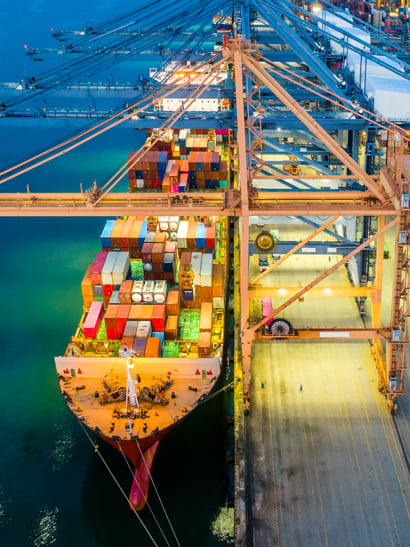For centuries, maritime class societies have been the bedrock of safety and standards in the shipping industry. However, in recent years, the maritime sector has faced unprecedented challenges, ranging from stringent regulatory frameworks and the rise of digital solutions for operational efficiency, to decarbonisation and the evolving geopolitical landscape, which are all reshaping the sector.
In this dynamic environment, class societies are evolving from their traditional role to become multifaceted advisors, guiding the industry through uncharted waters. These transformative pressures are reshaping everything from vessel design to operational strategies, creating a complex landscape that demands expert navigation.
It's against this backdrop that LR is strengthening its advisory services, uniting its Technical Advisory and Business Advisory teams into a single Advisory team, to help industry stakeholders navigate this evolving landscape. LR Advisory comprises multidisciplinary experts who understand the intricacies of maritime operations and can guide clients through regulatory compliance, risk management, and performance optimisation.
LR has offered advisory services for nearly 80 years, providing technical expertise and strategic guidance. However, this is not simply a continuation of the past—it is a reinvention.
"Shipping is moving from an industry that has traditionally been able to be reactive and has historically been relatively lightly regulated outside safety issues," says James Frew, who jointly heads the new Advisory team. “However, what's different today is the sheer scale and complexity of the challenges facing the industry.”
“This isn't just about ticking boxes or meeting compliance standards. It's about fundamentally rethinking how ships are designed, built, and operated. This involves embracing new technologies, exploring alternative fuels, and optimising performance to reduce environmental impact and improve profitability. It means proactively shaping the future, rather than simply reacting to it.”
Historically, LR's advisory services focused primarily on compliance and technical support, assisting clients with regulatory requirements and operational best practices. While these services remain crucial, the new advisory framework incorporates a more comprehensive approach, integrating digital tools, policy insights, and regulatory expertise to provide a 360-degree solution. Whether supporting shipowners with compliance strategies, helping charterers with decarbonisation goals, or assisting future fuel suppliers in entering the maritime market, LR Advisory is broadening its reach to new clients and sectors.

A key driver behind this renewed focus is the twin challenge of decarbonisation and digitalisation.
Traditionally, shipping has been a reactive industry, operating under relatively light-touch environmental regulations. However, with regulatory frameworks such as the IMO mid-term measures and the Carbon Intensity Indicator (CII), as well as regional initiatives such as EU ETS, FuelEU and California onshore power, shipowners and operators can no longer afford to delay proactive decision-making.
With increasing regulatory pressures and societal expectations surrounding environmental responsibility, LR Advisory can help shipowners understand the risks of inaction and develop strategies to thrive in a low-carbon future. These include support for identifying alternative fuels, optimising fleet performance, regulatory guidance, and implementation strategies to facilitate the shift towards greener energy solutions.
Another challenge is convincing some shipowners that the energy transition is not optional. "In the case of decarbonisation, it's shifting away from being a ‘nice to have’ to being something that's fundamentally hitting the bottom line," Frew explains.
“Compliance is just one aspect; improving operational efficiency and lowering emissions are now crucial to maintaining competitiveness. I think also allied to that is the realisation that to properly decarbonise, digitalisation is probably one of the most powerful tools you can have.”
The integration of digital solutions into LR Advisory allows clients to harness data-driven insights for better decision-making. This capability is essential as the maritime industry increasingly relies on technology to enhance operational efficiency, lower fuel consumption and reduce environmental impact.
“The integration of digital solutions into our advisory services enables a more comprehensive understanding of operational performance,” explains Frew.
“By harnessing data analytics, we can provide actionable intelligence that helps organisations optimise their operations, reduce costs, and uncover new market opportunities. This shift towards data-driven decision-making is crucial as businesses seek to improve efficiency while also addressing sustainability goals,” he adds.
Beyond its long-standing support to shipowners, LR is also expanding its advisory services to stakeholders from wider parts of the value chain. Large charterers, oil majors, and future fuel suppliers are increasingly looking to LR for guidance. Many of these companies may never own a vessel, but their involvement in the maritime sector is critical to shaping its future.
One of the biggest misconceptions in the maritime sector is that advisory services are only for large corporations. Historically, smaller independent shipowners have been reluctant to invest in advisory support. However, this is rapidly changing. Increasing regulatory complexity and competitive pressures are driving even smaller operators to seek external expertise.

Government engagement represents another key focus area, helping them to align their maritime sectors with the challenges of the 21st century. This includes strategic guidance on infrastructure investments, such as port development, investing in onshore power supply and alternative fuel facilities, as well as support in enhancing flag state administrations and boosting national maritime sectors.
“In a world of geopolitical uncertainty, the shipping markets can be volatile. LR's advisory services can help owners to make the most of opportunities, while also mitigating risks,” explains Frew. “By providing expert guidance on regulatory changes, technological advancements, and market trends, we help organisations to make informed decisions and stay ahead of the curve.”
“The rise of China and other Asian economies has also had a significant impact on the maritime industry. With a global team of nearly 120 advisory experts, we’re well-positioned to support businesses in emerging markets, providing local expertise and global insights,” he adds.
However, this approach is not just about compliance, technology, or geopolitics—it is about people. The maritime industry is built on human expertise, and even the most advanced digital solutions require skilled professionals to operate them effectively.
“The human factor is central to our advisory services, from crew training to leadership development and change management. Technical efficiency alone does not guarantee success; it is the culture of an organisation, the training of its personnel, and the ability to adapt to new technologies that ultimately drive performance,” says Frew.
LR’s advisory expansion aligns with its broader transformation from a classification society to a modern maritime professional services organisation. This shift reflects the changing nature of the industry. Increasingly, stakeholders are looking for partners who can provide more than just regulatory compliance – they want strategic insights, digital expertise, and hands-on support in implementing solutions.
With its renewed focus, LR Advisory is a trusted partner to guide them through the complexities of the modern maritime landscape, ensuring that they remain competitive, compliant, and ready for the future.



